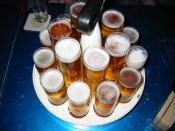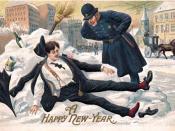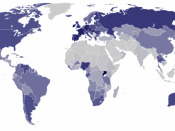1,700 college students between the ages of 18 and 24 years old die every year from alcohol-related causes (Krupnick, 06). Casual drinking and binge drinking play a big social role in college experiences. Binge drinking is classified as consuming five or more drinks in one night, according to the 1993 Harvard School of Public Heath study. The Harvard School of Public Health study also concluded 43% of students admitted to binge drinking. Drinking in college can lead to problems including injuries, breaking the law, risky sexual behavior, poor grades, sexual assault, fights, and motor vehicle accidents. Clearly, consuming alcohol negatively impacts college students.
Drinking leads to a decline in academic performance. The National Institute on Alcohol Abuse and Alcoholism (NIAAA) reports about 25 percent of college students have academic problems caused by alcohol use, such as earning lower grades, doing poorly on exams or paper, missing class, and falling behind.
Last semester I attended college-drinking parties regularly. My grades reflected my choices; I received a 0.77 grade point average for my fall term. I honesty believe drinking played a large role in my academic failure. I did not drop out of college unlike many other students. Alcohol is related to 29 percent of dropouts according to a survey of university administrators (Rubin, 2005). Alcohol clearly affects a student's education. A study performed by Amy Wolaver, an economist at Bucknell University, showed the impact of binge drinking on grades. The average drop in a student's grade point average (GPA) was about 0.28 for women and 0.30 for men. Alcohol doesn't only effect students' grades.
Alcohol consumption among college students leads to dangerous situations and poor choices. Decisions such as driving drunk and getting into cars with intoxicated drivers could affect a person for life. I am a prime example of this...


